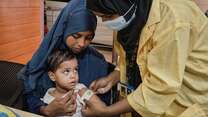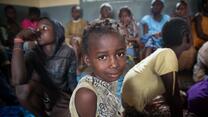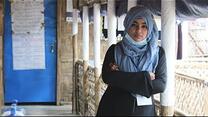The COVID-19 pandemic has had an unprecedented impact on education around the world, with the closure of teaching institutions impacting an estimated 91 percent of students – approximately 1.6 billion children and young people. But for Rohingya children, adolescents and youths in Cox’s Bazar, Bangladesh, interruptions and barriers to education are not new. Government restrictions on access to certified and standardised education opportunities have left informal education by humanitarian agencies as the only pathway to any form of education. A pilot of the Myanmar curriculum targeting 10,000 Rohingya students was due to begin in 2020 but was postponed after COVID-19 lockdown and the closure of learning facilities.
Report
Our efficiency
- 87% Program services
- 7% Management and general
- 6% Fundraising
Join our mailing list
Get the latest news about the IRC's innovative programs, compelling stories about our clients and how you can make a difference. Subscribe
International Rescue Committee is a 501(c)(3) not-for-profit organization. EIN number 13-5660870
Copyright © International Rescue Committee, 2026.



